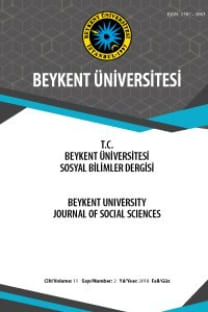PROBING THE FEASIBILITY OF THE INDIGENISATION OF NIGERIAN MEDIA IN AN ERA OF CULTURAL GLOBALISATION: A STUDY OF NIGERIAN RADIO AND TV PRODUCERS
PROBING THE FEASIBILITY OF THE INDIGENISATION OF NIGERIAN MEDIA IN AN ERA OF CULTURAL GLOBALISATION: A STUDY OF NIGERIAN RADIO AND TV PRODUCERS
Cultural Protectionism, Cultural Globalisation, Local Content Regulation, Media Indigenisation, Media Imperialism Westernization,
___
- Aliagan, A.R. (2017). Kawu: Changing the narrative in Nigeria’s broadcasting industry. Time Nigeria Magazine, Retrieved May 9th, 2018 from http://timenigeria.com/kawu-changing-the-narrative-in-nigerias-broadcasting-industry/ (Accessed 9, 2018).
- Bobda, A.S. (2000). The uniqueness of Ghanaian English pronunciation in West Africa. Studies in the Linguistic Science. 30(2): 185-198.
- Centre for International Governance Innovation. 2014. The internationalisation of indigenous rights: UNDRIP in Canadian context. Special report. Waterloo: CIGI.
- Effiom, V. E. (2005). Electronic media management in a developing democracy. Calabar: Balynhen Nigeria Limited.
- Ekpang, E. J. (2008). Globalization and cultural imperialism: The Nigerian experience. West African Association for Commonwealth Literature and Language Studies 2(2):1-17.
- Endong F. P. (2014). Westernisation of audiences as a threat to the indigenisation of media broadcast in Nigeria. In JMC: Journal of Media and Communication Studies 6(8): 121-129.
- Endong, F.P.C. (2015). Indigenisation of media in Nigerian and cultural globalisation: Mutual bedfellows or implacable foes? Journal of Globalization Studies 6(2): 106-118.
- Endong, F.P.C. (2018). Culture and heritage preservation in an era of globalization and modernism. A comparative study of China and Nigeria. In Handbook of research on heritage management and preservation, ed. Patrick Ngulube, pp.320-339. Hersey: IGI Global.
- Forbes. (2017). Globalisation. https://www.forbes.com/sites/quora/2017/08/28/is-globalization-creating-a-single-world-culture/#c0a417a3bd36 (Accessed 7 April, 2018).
- Grawhall, N. (2006). MDGs, globalisation and indigenous people in Africa. Indigenous Affairs 1(6): 6-13. Huntington, S, (1993). "The clash of civilizations". Foreign Affairs. 72 (3): 22–49.
- Koblowe, O. & Madu, O. (2012). “Programming content of Nigerian broadcast media: Towards an indigenizing paradigm” in Estudos em comunicacao 1(8): 75-91.
- Leornard, C. (2016). Local content quotas on TV are global – but they just don’t work everywhere. The Conversation https://theconversation.com/local-content-quotas-on-tv-are-global-they-just-dont-work-everywhere-60656 (Accessed May 9th, 018).
- McWhorter, J. (2014). The “ax” versus the “ask” question. Los Angeles Times. http://articles.latimes.com/2014/jan/19/opinion/la-oe-mcwhorter-black-speech-ax-20140119. (Accessed June 3rd, 2018).
- Nigerian Broadcasting Commission. (2016). The Nigerian Broadcasting Code (6th edition), Abuja: Nigerian Broadcasting Commission.
- Omoera, O.S. & Ibagere, E. (2010). Revisiting media imperialism: A review of Nigerian television experience. The International Journal of Science and Review 5: 1-18.
- Revise Sociology (2015). What is cultural globalisation. Revise Sociology. https://revisesociology.com/2017/05/25/cultural-globalization-definition-examples/ (Accessed 7 April, 2018)
- Salawu, A. (2004). The Yoruba and their language newspaper: Origin, nature, problems and prospect. Studies of Tribes and Tribals. 2(2): 79-92.
- Salawu, A. (2006). Paradox of a milieu: Communication in African indigenous languages in the age of globalisation. In Indigenous language media in Africa, ed.Salawu A., pp.1-20. Lagos: Centre for Black and African Arts and Civilisation (CBAAC).
- Samalavicius, A. (2005). Culture and globalization. Eurozine. Retrieved April 9th, 2018, from https://www.eurozine.com/national-identity-culture-and-globalisation/
- Steffensen, N.K. (2012). BBC with an Accent: “African” and “Asian” Accents. Meta, LVII(2), 510-527.
- Suryadinata, L. (2011). Migration, indigenisation and interaction. Chinese overseas and globalisation. Singapore : World Scientific Publication Co.
- Thinus, F. (2016). SABC set to bulldoze SABC3 schedule. Channel 24, from https://www.channel24.co.za/TV/News/sabc-set-to-bulldoze-sabc3-schedule-20160601 (Accessed May 9, 2018).
- Van der Puye, F. (2008). Media and the preservation of culture in Africa. Cultural Survival Quarterly Magazine, 22(2): 32-49. https://www.culturalsurvival.org/publications/cultural-survival-quarterly/media-and-preservation-culture-africa (Accessed May 11, 2018)
- Watson, J. L. (2016). Cultural globalisation. Encyclopedia Bitannica. https://www.britannica.com/science/cultural-globalization (Accessed September 8, 2016)
- ISSN: 1307-5063
- Yayın Aralığı: Yılda 2 Sayı
- Başlangıç: 2007
- Yayıncı: Beykent Üniversitesi
GÜVENLİK İKLİMİNİN BELİRLEYİCİLERİ: DEMOGRAFİK FAKTÖRLER, HİYERARŞİK KÜLTÜR VE ÖRGÜTSEL ÖZDEŞLEŞME
Ali GÜRSOY, Mustafa Kemal TOPCU
TÜRKİYE’DE KADIN GİRİŞİMCİLERİN VE FİNANSMAN ALTERNATİFLERİNİN ANALİZİ
Gülay SELVİ HANİŞOĞLU, Gamze ÖZGÜR
MAVİ YAKALI VE BEYAZ YAKALI ÇALIŞANLARIN TÜKENMİŞLİK İLE ÖFKE YÖNETİMLERİ İLİŞKİSİ
